

Project «Voices of Jewish settlements. Vitebsk region.»פיתוח קשרי התרבות בין העמים של ישראל ובלרוס
|
|---|
Website search |
|
MainNew publicationsContactsSite mapVitebsk regionMogilev regionMinsk region |
Memories of Polina (Pesia) Kozhevnikova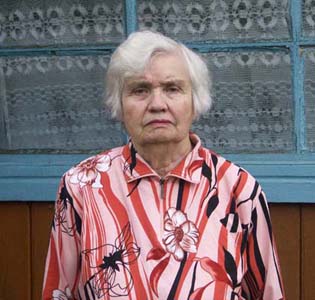 Polina Zakharovna Kozhevnikova
Polina Zakharovna Kozhevnikova
I was born in the Crimea but our family originated from Gorodoksky region. It happened because in 1924-1925 many Jews moved to the south of Ukraine to work in agriculture. Special Jewish agricultural settlements were built there on unoccupied land. My parents settled down 18 km from Simferopol and 3 km from Sarabus station. Mother, Lelia Yudovina, arrived there earlier, and then my father Zalman Nehamchin came a year later. They got married and I was born in 1926. One of my grandfathers was from a village called Kuzmino, the other – from Besenyata village (not it is called Svetlaya and many people don’t know the previous name). Both these villages are in Gorodoksky region. My mother had an elder brother, Yakov Yudovin. When he found out that Jews should move to uninhabited land in the south of Ukraine, he was eager to go. Mother’s dad said that if his son was going, then he would go, too. This is how they turned out in the Jewish settlement in Ukraine, the whole family. My sister Mira was born there, now she lives in Germany. Then communes appeared and everything had to be shared. My uncle was the first to give his things away: his cow, his horse and even forks and spoons. Nothing was left in the house. I remember it so well because I had serpigo and my parents couldn’t find a spoon to feed me. Later communes were replaced by collective farms. In 1932 my grandfather, wrote to us that we should move back to Belarus because of unstable situation in Ukraine. He still lived in Bychiha, in Gorodoksky region. And my father made a decision to go back. 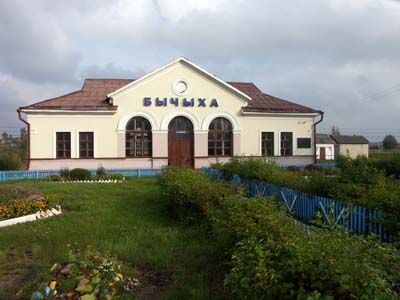 Railway station in Bychiha
Railway station in Bychiha
Bychiha was a rather big settlement populated by Belarusians, Russians and Jews. Among the Jews were the Pliskins: Joseph with his wife Riva, and their four children: Haya, Milia, Boris, Leva. In 1939 they moved to Gorodok, during the war they evacuated and lived in Sverdlovsk. Mikhail Bruk lived in Bychiha with his wife Fruza, who was his second wife. She was Russian. His first wife was also Russian – Maria and they had two children – daughters Lida and Rimma. In 1941 the Nazis hanged Mikhail Bruk on a railroad crossing. The reason - because he was Jewish. He was hanging there for almost a week and then was buried in a Russian cemetery, because Bychiha did not have a Jewish one. Before the war Jews had been buried in Gorodok, during the war – just anywhere. There were also two Bravin brothers. The first, Haim, with his wife Riva, was evacuated in 1941. The second, Simon, together with his wife Sonia, was killed by Germans in October, 1941. They were both buried in Bychiha in that grave. Simon had two children: son Alik, who was killed at the battlefront in 1942, and daughter Ester, who lived in Leningrad after the war and died in 1999. Then there was Simha Potashinsky’s family: wife Liba-Sore, children Boris and Lilia. They were evacuated. After the war Boris lived in Velikie Luki and died there. Lilia is now living in Germany. There was Yuda Vaykhansky with his wife Dasha and children Liza, Yania, Menia. They were evacuated. Yuda’s son died at the battlefront. Lilia lived in Leningrad, son Menia went to school with me. My grandfather’s family – my grandfather David Nemhachin, born in 1861, lived with his wife Risha and children Simha, Ginda, Menia and Zalman (my father). Simha moved to Gorodok before the war. When the war started, my father Zalman was sent to the battlefront and Simha was allowed to accompany his family to the place of evacuation. He had three children: Nina, Mulia and Edik. The youngest one was only 8 months old. We went with them. We walked 350 kilometers to what is now known as Tverskaya region. 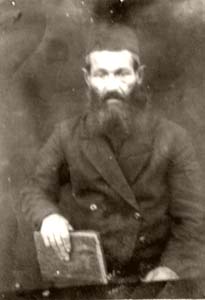 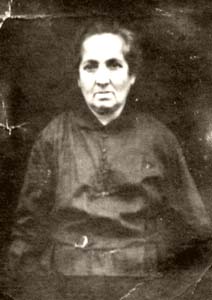 Nehamchin David and Nehamchina Risha
Nehamchin David and Nehamchina Risha
So we left Bychiha, the whole family. My grandfather Mendel Lazarevich refused to join us because he decided to stay with David Abramovich Nehamchin. David Abramovich was a truly religious well-read person; he said: “I believe in God and nobody will do me any harm. I have not treated anyone badly. So, I will stay.” Now I think that because he could not walk very well after a stroke he decided not to burden anyone and stayed. Grandfather said he could not leave him alone, so he and my grandmother stayed. Eventually we reached Sverdlovsk region. My father was at the battlefront and was discharged in 1942. I remember his coming. My mom immediately burnt his jersey because it was filled with lice. He came in February, 1942 and died on May 31st, 1942. I was the breadwinner of the family, since mom had a heart defect. When father came back home I became ill with typhus and had to go to hospital. So, father went to work to a stable, where he caught a cold and died. 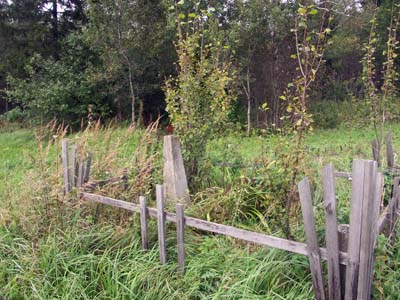 Memorial to Jews executed in Bychiha
Memorial to Jews executed in Bychiha
Bravin Simon and Tonia, Nehamchin David and Risha, Judovin Mendel - they were all buried in a mass grave in Bychiha. I was told a story of how they managed to survive till October, 1941. They were not taken to the Gorodok ghetto – Germans did not pay attention to old people that much. However, the local policemen were not happy with that. Tonia Bravina, Simha’s wife, had a sister, who had long before converted into Christianity. When the Nazis came, of course, they were informed she was a Jew. However, she had documents proving she was Christian. So, the Germans told her to collect a hundred signatures to prove she actually adhered to Christian traditions. That was what saved her. She and her husband decided to save Tonia and her husband. They dug a shelter somewhere in a forest but Tonia refused to go. They said they had not done anything bad to be killed. Germans somehow found out that there was a plan to save them and executed them immediately. 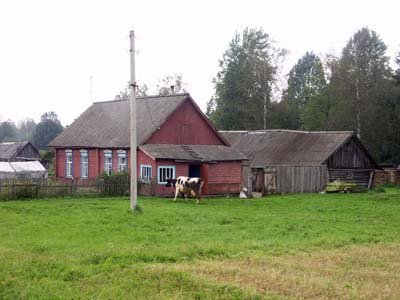 Bychiha
Bychiha
There was another Jewish family that lived in Kuzmino before the war – Moisey Zinman, his wife Riva and two children Rosa and Saul. Saul died at the battlefront. The rest managed to evacuate. Another family – Kopl Potashinsky, who had seven children, lived in Malashenki. Simon died at the battlefront, Nina converted into Christianity, Tonia was shot in Bychiha. Three sisters Frida, Risha and Raya, who lived in Berezovka, were also killed there. I do not know where their grave is. When I came to Bychiha after the war, I found both our and grandfather’s houses intact but everything inside had been looted. Policemen’s families had taken everything. We were offered to settle in Sverdlovsk region and promised a house and jobs but we came back. Our house was empty and mother said that we would not be able to live there, since everyone else had been killed. We sold the house and moved to Gorodok. This was at the end of 1944 – beginning of 1945. I worked in different organizations, got married in 1947. My husband’s family had been executed on the Vorobiev Hills. |
|||
|
|
Jewish settlements in Vitebsk regionVitebsk • Albrehtovo • Babinovichi • Baran • Bayevo • Begoml • Beshenkovichi • Bocheikovo • Bogushevsk • Borkovichi • Braslav • Bychiha • Chashniki • Disna • Dobromysli • Dokshitsy • Druya • Dubrovno • Glubokoye • Gorodok • Kamen • Kohanovo • Kolyshki • Kopys • Krasnopolie • Kublichi • Lepel • Liady • Liozno • Lukoml • Luzhki • Lyntupy • Miory • Obol • Oboltsy • Orsha • Osintorf • Ostrovno • Parafianovo • Plissa • Polotsk • Prozorki • Senno • Sharkovshina • Shumilino • Sirotino • Slaveni• Smolyany • Surazh • Tolochin • Ulla • Verhnedvinsk • Vidzy • Volyntsy • Yanovichi • Yezerishe • Zhary • Ziabki •\ |
Main |
New publications |
Contacts |
Site map |
Vitebsk region |
Mogilev region |
Minsk region |